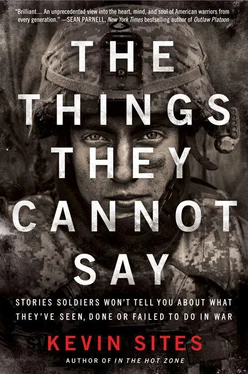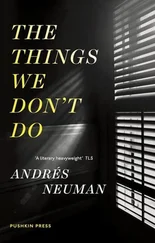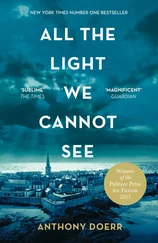“I felt completely sick to my stomach and nauseous. On one hand you’re worried about your Marines and the ones who pulled the trigger. You’re hoping to God you find out this guy is an insurgent. Then you start thinking, Could we have done anything differently? Almost immediately I was replaying things in my head. It was a nauseous confusion. You feel sick to your stomach that you’ve killed this innocent guy, but you’re hoping he’s a bad guy. And you kind of go back and forth with it.”
When Iscol went back to the truck he heard his platoon sergeant yelling at the lance corporal for shooting downrange toward the spot where Iscol had been waiting with the spike strips. It was the same machine gunner who had been the main source of firepower unloaded on the dump truck. Iscol knew that with his plan to capture retreating insurgents, he had devised a bad field of fire. The lance corporal had been right to fire on the truck and had lined up his fire properly. Iscol had just been in the wrong spot. And it seemed clear to him they had also killed the wrong man—a civilian.
“We needed to tell him [the lance corporal] he did the right thing and he needs to do the same thing tomorrow,” Iscol says. “And that kills you. You’re responsible for your Marines’ welfare when you’re there, but also for their mental health when they come home.” If that lance corporal had hesitated, other Marines or Iraqi soldiers may have died. Still, the truth of and responsibility for what had happened, justified or not, sat uneasily on Iscol’s shoulders. He felt very much alone in his command.
“We brought the body back to camp and batted him and took him to the Iraqi police station. [24] “Bat” is military shorthand for “biometric automated tool,” an eye scan the American military uses to check individuals against a database of known insurgents and terrorists.
As I was writing the incident report, I remember being nervous about whether we were going to get in trouble. I was a little surprised how quickly it was settled. I got an e-mail back with ‘case closed.’ The shooting was considered justified. When everything was finally in the clear, I worried that we weren’t putting enough emphasis on the value of Iraqi life,” says Iscol. “We got to protect ourselves but this guy died. I wanted the regiment, the MEF [Marine Expeditionary Force], to acknowledge that this was a human life and that it warranted an investigation.”
But the value of that life was not lost on Iscol when the brother of the Iraqi truck driver who had been killed came to the base to meet with him.
“I spent most of the day with this guy and learned about his family,” says Iscol. “The brother told me that he [the driver who was killed] married late in life because he had spent most of his time taking care of his mother. He also had two young children.” Iscol also found out from the brother the likely reasons why the man they had killed did not stop at the checkpoint. He had poor eyesight and the brakes on the dump truck were bad.
“I called a JAG officer and immediately made a reparation of twenty-five hundred dollars, which was going rate for wrongful death. [25] Judge Advocate General (JAG) officers advise their specific commands concerning a broad range of legal issues, but most specifically concerning application of the Uniform Code of Military Justice (UCMJ), which is the primary legal code for internal American military matters.
I think he [the driver’s brother] was scared to death coming to see us. I can only imagine what it’s like for him. When I’d apologize for what had happened he’d say it’s God’s will, it was his time. My translators and I were really worried that he would be robbed and killed for the [reparation] money, so Abood drove him home.
“Abood was very deferential and kind to the brother, but also continued to empathize with me. ‘It was a tragedy,’ he told me, ‘because it couldn’t happen any other way. Everyone made the best decisions they could with the information they had.’
“At the time, I kept reinforcing that, but I blame myself now,” says Iscol. “When I look back on it, I reacted as if there were a fifty percent chance the truck coming at us was a suicide bomber. I wish we had taken more risks. But if something happened to my Marines and they became endangered I would have felt completely opposite. Still, I question, did we make ourselves safer for this action or create more insurgents?”
Later, the incident would also challenge him to think about the bigger picture, the strategic one, about the military’s emphasis on “force protection,” safeguarding the lives of U.S. troops first, sometimes at the expense of innocent civilian lives, as in this incident. [26] “Force protection” refers to the measures a military unit takes to ensure the safety of its own troops. When force protection is a military priority, tolerance for risk is usually low. For example, if a vehicle is speeding toward a checkpoint and can’t be properly identified, force protection protocol may allow troops to shoot to kill the occupants before positively identifying them as hostile. In this instance, Iscol wonders if less force protection and a willingness to take more risks might’ve helped identify the driver as a civilian and prevent his death.
And after years of robustly defending the mission, volunteering to go to Iraq not once but twice, Iscol also began to wonder, after his deployment, whether the American military should’ve ever gone there in the first place.
But Iscol didn’t have a lot of time to contemplate what happened in Iraq while he was in there. As the summer wore on, so did the tensions mounting in Fallujah, and incidents around the camp reinforced his unsettled feelings about his mission so far.
“We had these two puppies, named after our call signs, Beowulf and Cannonball. Beowulf ate fly poison and began convulsing. None of the Marines wanted to put it down,” says Iscol. “A Navy corpsman called me over and I put a sandbag over the puppy’s head and killed it with my nine-millimeter. That was the moment when I realized this was going to be a lot different than I thought it would be. Thought I’d be killing insurgents and stopping fanatics—instead I killed a puppy.”
When Iscol first returned home from Iraq, he felt a sense of urgency to confirm that his service in Iraq did indeed have purpose. At various engagements he spoke with a zealous assurance that America had been right to go to war in Iraq. But as the months went by, Iscol began to see through his own bluster and did what he was educated to do: contemplate his experiences more deeply. One seminal operation dominated his thoughts, the Battle of Fallujah in November 2004, when American and Iraqi troops took back the city from insurgents, but at a cost of nearly leveling it.
“We came home from that deployment thinking we had accomplished a lot of things. Insurgent activity, especially in al-Anbar Province, was almost nothing,” says Iscol. “But when I saw things go to shit again I wondered what we really had accomplished. You begin to see with great clarity what happened in Fallujah. We looked at Blackwater [the killing and burning of the bodies of four American security contractors] as the beginning. But for Iraqis it started a year earlier,” says Iscol.
“With the benefit of hindsight, I’ve become more thoughtful about what we did there. I don’t think you can really go to combat and not look back, not reflect. When you go to war and you come back it doesn’t leave you. How can you not think about things differently?”
One of the things Iscol knew he could not leave behind in Iraq was his interpreter Abood. Because of his work with American soldiers and Marines, Abood, his wife and his four daughters became the target of constant threats, which eventually forced them to leave Iraq and take refuge in Jordan, along with thousands of others. At the time the U.S. immigration policy for Iraqis, even those who assisted American forces, was to allow only a trickle to enter the U.S., three thousand per year.
Читать дальше












